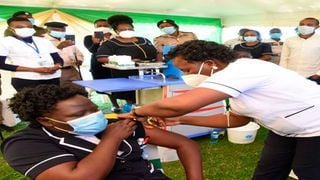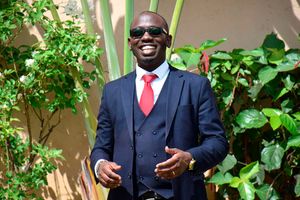
Governor of Kakamega Wycliffe Oparanya (right) looks as Head of Nursing at Kakamega County Referral General Hospital Jacinta Angie receives Covid-19 jab from nursing officer Beverlyne Wambani in this picture March 12, 2021.
News
Premium
Puzzle of missing Sh1.2bn in budget for new health workers
What you need to know:
- Last year, the Health ministry hired 1,000 interns to work in various health establishments in the country as it grappled with the pandemic.
- The interns risk losing their jobs since there is no money directed to paying them specifically in the new financial year.
Despite the allocation of Sh1.2 billion by Treasury for the hiring of more health workers in the coming financial year, a National Assembly analysis of the 2021/22 financial budget estimate reveals that the funds “cannot be traced”.
Treasury yesterday allocated Sh1.2 billion for the recruitment of health workers in the financial year starting July as the number of Covid-19 infection continues to rise.
“However, this allocation cannot be easily traced in the budget estimate books despite being mentioned in the budget summary by the National Treasury,” the analysis discloses.
Last year, the Health ministry hired 1,000 interns to work in various health establishments in the country as it grappled with the pandemic. The highest paid intern earned a gross salary of about Sh180,000. The interns risk losing their jobs since there is no money directed to paying them specifically in the new financial year.
The analysis by the National Assembly also reveals that a total of 650 Covid-19 ‘specialists’ will be engaged, with 28 hospitals supplied with equipment. It does not reveal whether part of the specialists will be medics, researchers, nurses or clinical officers.
It goes on to disclose that the ministry also does not have the capacity to vaccinate 30 per cent of the population as it had projected since it only has Sh3.9 billion. The proposed 2021/22 MoH estimates that the cost of vaccinating 30 per cent of the population is Sh34 billion.
Strong health workforce
“A total of Sh3.9 Billion has been provided in the proposed 2021/22 financial year under the GOK/Gavi partnership through the Covid-19 vaccine global Access (Covax) with Sh3.9 billion provided in the proposed 2021/22,” says the analysis.
Dr Simon Kigondu, the secretary-general of the Kenya Medical Association (KMA) said the Covid-19 pandemic has shown that having a strong health workforce is key to supporting communities through any health emergency.
“The agility with which countries were able to manage the surge in health workforce demands is a key difference between successful and struggling responses,” he said.
Data by the Kenya National Bureau of Statistics (KNBS) and the Kenya Institute for Public Policy Research and Analysis (Kippra) show that although there has been a remarkable expansion of healthcare infrastructure by counties, the number of facilities and workforce remain inadequate to meet demand by a steadily rising population in need of such services.
The Kenya Medical Practitioners and Dentists Council data shows that there are about 14,973 local practitioners and another 1,023 registered foreign doctors. The data further reveals that there are 538 interns and 3,303 specialists.
Only 12 per cent of health facilities had all items for standard precaution for infection prevention such as disposable syringes, disinfectant, safe final disposal of sharps, safe disposal of infectious waste, alcohol-based sanitisers, and appropriate storage of infectious waste.
The report shows that on average, health facilities had 55 per cent of basic amenities available, with only six per cent of them having all basic amenities.






